|
This past Sunday, the final Sunday of the liturgical year, we celebrated the Solemnity of Our Lord Jesus Christ, King of the Universe. On this solemnity, the Church recalls the sovereignty of our Lord over the universe and in our hearts. We are called to look forward to the “definitive and eternal kingdom of Christ”, which Pope Emeritus Benedict XVI identified as “the ultimate goal of history”. Having been with the Father at the very beginning, when the world was “without form or shape” will fully manifest His lordship at the end of time (cf Genesis 1:2). This past Sunday’s reading from St. Matthew’s gospel presents the great scene of this final judgment, where He who “sits upon His glorious throne with all the nations gathered before Him” will separate the “sheep from the goats”, that is, identify those who have recognized and accepted the Word of God and its messengers and those who rejected it (Matthew 24:31-32). The point of the Gospel, is not so much identifying who are the sheep and who are the goats, but, as Pope Francis noted, determining whether we live our lives in “imitation of Jesus’ works of mercy through which He brought about His kingdom. “
Christ’s reign is unlike any earthly notion of kingship (cf. Matthew 21:1-11). He completely identifies Himself with the poor, the sick, and the afflicted. He does not ignore the weak, the needy, or the marginalized. Christ’s kingdom is one of love, service, and Truth, not one built up by weapons, violence, or a lust for power. Unfortunately, Christ’s contemporaries frequently misunderstood the kingdom being preached as an earthly, political one. After the multiplication of the loaves, for example, the masses were so enthralled by the miracle that they wanted to declare Jesus as their king on the spot to overthrow Roman rule. Later, in the Garden of Gethsemane, a zealous Peter begins to fight those who came to arrest Jesus. Both times, Jesus knows the will of His Father must be completed: He withdraws to pray in the first instance, and, after rebuking Peter, submits to the mob in the second. Hearing of a new kingdom and servants, the Pontius Pilate has Jesus presented before him, but is taken aback at what he sees: the one who dared to challenge the might of Rome has been abandoned by his followers, and his enemies are crying for a most humiliating execution (cf. John 18:37). The Roman governor asks Jesus, “Are you the King of the Jews?” (v. 33). In spite of the injury and insult He is suffering, Jesus clarifies the nature of His kingship, which is no worldly power but a Love which serves. He states that His kingdom is in no way to be confused with a political reign: “My kingship is not of this world… is not from the world” (v. 36). The kingdom that Christ inaugurates is universal. It is not confined to political borders or a single ethnic group but rather, it is universal and communal by being present among those who love as He loved, and serve as He served. In seeking the Kingdom of God, one only has to look towards those who are suffering hardship in their lives. How can one hope to enter the Kingdom based on justice, love, and peace, if that person turns a blind eye to the needs of his neighbors (cf. Luke 10:25-37)? Mother Teresa addressed this hypocrisy: It is not enough for us to say, “I love God, but I do not love my neighbor.”… How can you love God whom you do not see, if you do not love your neighbor whom you see, whom you touch, with whom you live? How, then, can we prepare for this Kingdom? Our Faith is not one we keep to ourselves, but something we are meant— and commanded— to share and give witness to every moment of our lives (cf. Matthew 28:19). We can bring others to Christ by our love, our service, and our humility, placing the needs of others, especially the marginalized, above our own. In doing so, and by forgoing the allures of worldly power and riches, we make ourselves ready for the greater Kingdom and Glory that Christ has promised us. And when each of us stands before Him at the Final Judgment and renders an account of the life we spent in imitation of our Lord, we can hope to hear the words, “Well done, my good and faithful servant! ... Come, share your master’s joy!” (Matthew 25:21). Thomas Wong is an undergraduate student at The Catholic University of America in Washington, D.C. For more information on bringing Christ’s love to others, check out the Catholic Apostolate Center’s New Evangelization Resource Page!
0 Comments
From the very beginning of my schooling, I can remember the constant encouragement of my family to do better – to strive for the highest goals. I’m sure we can all remember being lectured about the importance of getting good grades, reading at a higher level, the absolute necessity in life for multiplication tables, etc. This led to being told how important it is to go to college, to do well in school, to graduate with a high GPA – with honors – magna-summa cum laude – I’m sure many of us have heard all this before, or are hearing it right now. These achievements are indeed important – they lead to us getting good jobs or moving on to higher learning. Without these accolades it would be difficult for us to achieve our goals.
Today, many of us are in an environment where we feel like we need to constantly achieve more – to gain notoriety, a high social status, or a promotion at work. While it’s always fine to strive for something, it is important to remember that it’s not all about being noticed – or being the best. There is so much more to life than trying to get to the top of the heap. In today’s Gospel, the disciples asked Jesus, “Who is the greatest in the Kingdom of Heaven?” (MT 18:1) Jesus presents the disciples with a child, instructing them that unless they become like the children, they will never enter the Kingdom. Jesus furthermore says, “Whoever humbles himself like this child is the greatest in the kingdom of heaven.” (MT 18:4) We are tasked to remember that being humble is an essential part of life. We shouldn’t be boastful or prideful when we succeed, we should be grateful for the opportunity to make a difference and help others. We should take a cue from our Holy Father, who has made the choice to actively be as humble as he can in word, deed, and action – even though it is not required of him. When we can, we should always choose to be humble, to allow others to go before ourselves, and to remember that if we want to enter the Kingdom we should think back to our childhood – where we were always looking up and not looking down. Chris Pierno is the Media & Marketing Manager for the Catholic Apostolate Center 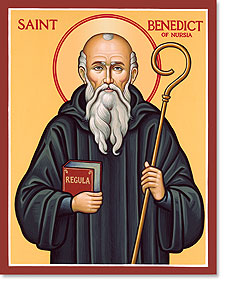 When you hear the word ‘hospitality’, what comes to mind? Like most people, I bet you think of hotels, or in some cases, you may think of that one aunt you have who always makes sure everyone’s glass is full and everyone has a seat. If you’re in ministry, ‘hospitality’ may now be synonymous with having coffee and light pastries at early morning meetings. But in a Benedictine sense, hospitality is very different. July 11th marks the Church’s feast of St. Benedict. In the early sixth century, St. Benedict wrote a Rule that he wanted his monks to follow. In 73 short chapters, St. Benedict tried to lay out an entire monastic way of life, so he certainly had a lot of ground to cover. He wrote about everything; from how an abbot should be chosen to how much monks were to eat and drink and where they were to sleep. He also devoted an entire chapter to how guests were to be received and treated. This whole chapter, which is quite brief, can be summed up in the first phrase the Founder writes, “Let all guests who arrive be treated as Christ…” (Ch. 53). Benedict goes into specifics on how guests are to be welcomed and fed, but it all goes back to Christ Himself saying “I came as a guest, and you received Me” (Mt. 25:35). St. Benedict understands, and wants his monks to understand, that Christ can be found in everyone. The first phrase of the last paragraph is a perfect summary of the Gospel message as well, “In the reception of the poor and of pilgrims, the greatest care and solicitude should be shown, because it is in them that Christ is received…” (Ch. 53). How do we treat the stranger on the street, the man selling us a magazine, the immigrant, or the receptionist? Remember also, this does not apply to just the stranger. How do we treat those that we see every day: the coworker, roommate, friend, or classmate? Are these people just a means to an end, are they here for our convenience or happiness, or are they Christ to us? Are we treating them as Christ incarnate or just as another person we have to deal with? Most likely we do not fall into either extreme, but every time we fall short of treating a person as Christ, we fall short of treating God as God. To be hospitable, we do not need to follow the exact instructions of St. Benedict. Our hospitality, like his, should be rooted in charity, in love. It can be quite simple: a smile, a since greeting, or the most common one at my alma mater, the holding of a door for a distant stranger. Hospitality is the easiest way to build up the Kingdom of God here and now. When we welcome the guest, greet the stranger, or feed the hungry, we are doing these things for both God and neighbor. By being hospitable, we are fulfilling the greatest commandment. Let us pray for the intercession of St. Benedict today, asking him to pray for us, that we may be hospitable, welcoming, and loving in every interaction we have. Michael Phelan is in his second and final year in the Echo Program at the University of Notre Dame. He is a graduate of Saint Anselm College, a Benedictine school, in Manchester, N.H.
In his final words as Supreme Pontiff, Benedict XVI reminded us from the balcony of Castel Gandolfo that he was “simply a pilgrim beginning the last leg of his pilgrimage on Earth.” In doing so, he reminded us, the faithful, that we too are on an earthly pilgrimage. Benedict’s goal, as well as ours, is the Kingdom of Heaven. As pilgrims, we travel around and seek the ways that will lead us to our destination. Though at times we go down the wrong path, we trust that, having faith in God, He will always bring us back to our goal, to be with Him. Thus, we are truly a “Pilgrim Church,” a community of believers on a voyage to Christ.
This past Sunday, we celebrated the great solemnity of The Most Holy Body and Blood of Christ, also known as Corpus Christi. The history of the feast goes back all the way to the early 1200s in modern day Belgium. St. Juliana of Liege, a Norbertine canoness, had a vision of a full moon with a dark spot. The spot, she believed, represented the absence of a feast dedicated to the Blessed Sacrament outside the season of Lent. After reporting her visions to her confessor and bishop, the bishop instituted such a feast in the diocese in 1247. Several years later, Pope Urban IV extended the celebration to the universal church in 1261. It was he who requested St. Thomas Aquinas to write hymns for the feast day. We know them today as the Pange Lingua and Panis Angelicus. Urban successors, most especially Clement V in 1311, reinforced the original decree and promoted the observance of the feast. One of the most beautiful and traditional aspects of the celebration is the procession of the congregation behind the Eucharist encased in a monstrance. On a personal note, this day has always been one of my favorites growing up. I loved walking with my family and friends around the church building (often stopping traffic!), all following our pastor holding the monstrance up as high as he could. In many ways, the Corpus Christi procession mirrors our pilgrimage (our procession) on earth. Together, with other members of the faithful, we are led toward God, whose real presence on earth is in the Eucharist. The Most Blessed Sacrament is the point in which heaven and earth meet. Not only is it our guide on earth, but also our guide to heaven. Processing around, following the Eucharist is a reminder that what we do on earth can lead us to an everlasting reward. By receiving the Eucharist, we are given the strength (both spiritual and physical) to continue on our earthly journey. As St. Thomas Aquinas once wrote, “Per tuas semitas duc nos quo tendimus, ad lucem quam inhabitas” (By your ways lead us to where we are going, to the light where you live.) Victor David is a recent graduate of The Catholic University of America in Washington, D.C. Recently the small town in New Jersey that I have been living in for two years while doing service made its way into the national news. Unfortunately it was due to a toxic chemical spill after a train derailed about ¼ of a mile from my house. Within hours of the accident, the three other women that I live with and I were being evacuated from our home. Fortunately two alums of our program kindly opened their doors to us and welcomed us under their roof.
As the days of evacuation turned into weeks, the fun of being somewhere new changed to the reality of being displaced. Not knowing when we would be able to return home, I began, like any good theology student, making theological reflections on our condition within the current liturgical season. Being evacuated, displacement, relying on the kindness of others to welcome us in — a perfect analogy as we celebrate this season of Advent. Feeling a little like Mary and Joseph, I found myself discovering consolation in their story. Under the roof of a stranger, Mary was welcomed in. Under the roof a stranger, our savior was born. Under the roof of a stranger, God was born as man. From under the roof of a stranger, great things can come! There is more than consolation found in the connection of mystery to the season of Advent. The eschaton[1] we reflect on during Advent reminds us of the story that has happened in the past, along with the reality of Christ being present today with our hope for Christ to come again in the future. What is it that the kindness of these “strangers” welcoming me under their roof calls me to? St John of the Cross, a mystic and doctor of our Church, writes in an Advent reflection; “If you want, the virgin will come walking down the road pregnant with the holy, and say, “I need shelter for the night, please take me inside your heart, my time is so close.” Then under the roof of your soul you will witness the sublime intimacy, the divine, the Christ, taking birth forever…” We are called to welcome another under our roof: Christ. Like the alums who welcomed in my housemates and me or like the inn keeper who found room for Mary, Joseph and Jesus, we too are called to open the doors of our hearts and welcome Christ to find a home under the roof of our souls. Today, in the midst of this season of joyful anticipation, we are called to welcome Christ fully into our beings so that when he comes again He might welcome us, in return, under the roof of His Kingdom. If you want, the virgin will come walking down the road pregnant with the holy, and say, “I need shelter for the night, please take me inside your heart, my time is so close.” Then under the roof of your soul you will witness the sublime intimacy, the divine, the Christ, taking birth forever, as she grasps your hand for help, for each of us is the midwife of God, each of us. Yes there, under the dome of your being does creation come into existence eternally, through your womb, dear pilgrim- the sacred womb of your soul, as God grasps our arms for help: for each of us is his beloved servant, never far. If you want, the Virgin will come walking down the street pregnant with Light and sing. ~St. John of the Cross, Advent Reflection Pam Tremblay is the Blog Editor for the Catholic Apostolate Center. [1] Eschaton/eschatology: is the theology that deals with the end of times and the doctrine of the last things. We speak of the eschaton/eschatology in advent when we are reminded of our waiting for Christ in his second come at the end of time. As I settle into my second year at a parish in South Jersey, and find myself responsible for the entirety of programs like First Eucharist preparation and family ministry, I’ve noticed that I must also find my own solution to a continual tension involved in running such programs. I’m calling it “the tension between the urgent and the important.”
There’s a sense of being bogged down by stuff that isn’t important in itself, but is necessary for the important stuff to happen. I don’t want to focus all my sacramental preparation time on ensuring the kids all have baptismal records; I want to make sure we have a coherent plan for how we’re forming them after baptism. I have to be able to find time to look beyond these minor concerns (even if I can’t move on without them) to notice and evaluate where the parish is headed in our ministry, and if that ministry really is allowing Christ to change hearts. Different personalities will use different strategies for managing this tension, so I can’t offer much of an explicit road map. However, we can all agree - it must be managed. If we don’t make time for the visionary in our ministries, we never move forward towards the vision. I understand that this year’s ministry won’t quite comprise the full realization of our eschatological hope, but I’m also in my last year at this parish, and I don’t want to accept continually the deferment, “Next year, we can actually catechize well.” As I contemplated this professional frustration, I realized there was an analogous tension in my life: contemplative prayer. I’ve often heard cited that “finding the time to pray” is difficult, but each of us needs to take a good hard look at what exactly are the things which supercede our prayer lives. As a parish minister, mine are especially ironic - “I can’t pray now, I have to get to work... so that I can balance envisioning the direction of the Church with executing the logistics involved.” I may be well-intentioned, but that prioritization isn’t ultimately fruitful. I cannot say that I am doing the work of the Church, whether important or less important, if I am not also praying through the work of the Church. “Everyone of us needs half an hour of prayer each day," remarked St. Francis de Sales, "except when we are busy—then we need an hour." This pithy quote is a roadmap to balancing the tension between my active ministerial work and the vision, which in this case actually is the Kingdom of God. The Catechism also calls me out: “The choice of the time and duration of the prayer arises from a determined will, revealing the secrets of the heart. One does not undertake contemplative prayer only when one has the time: one makes time for the Lord, with the firm determination not to give up, no matter what trials and dryness one may encounter” (2710). Isn’t it ironic that the trial can be a temptation to plan out the best work of the Church? I have to be able to make (not “find”) time to look beyond my work (even if the Church couldn’t move on without it) to notice and evaluate where I’m headed in my prayer life, and if that prayer life really is allowing Christ to change hearts... especially my own. I don’t want to promise continually, “Tomorrow, I will actually pray well.” Laura Berlage serves as an Echo Faith Formation Apprentice in the Diocese of Camden, NJ Our Church breathes through the two lungs of Scripture and Tradition, and as members of the Church we are called to do the same to live a flourishing life. The Catechism of our Church explains the importance of Scripture saying, "And such is the force and power of the Word of God that it can serve the Church as her support and vigor, and the children of the Church as strength for their faith, food for the soul, and a pure and lasting fount of spiritual life" (CCC 131). In order to inspire a life of apostolic vocation with strength and vigor, we begin today our first installment of the "Scripture to Life" series. Through the intercession and example of Our Lady, Mother of God and Queen of Apostles, we hope that the Word of God may be enfleshed by you.
Throughout my spiritual journey I have always struggled with pinpointing the virtue of humility in my life. I don’t think this is due to any lack of desire for the virtue, (it usually isn’t) but rather a lack of true understanding of the virtue. In the Gospel passage of John 13, Jesus washes the feet of his disciples and as he approached, Peter asked, “Master, are you going to wash my feet?” Whenever I read this passage, I always anticipate what Peter says next: “You will never wash my feet!” For some reason, I am always drawn to Peter’s stark rejection of Jesus’ perfect example of humility. If you have practiced lectio divina before, you know that when a part of Scripture confuses the heck out of you, that is exactly the point where you must stop reading, close your eyes, and listen.; It is specifically in this moment that God seeks to transform you through the power of his living word. My meditation on this passage continues with reflecting on exactly what was going through Peter’s mind and heart at the moment of his objection: confusion and feelings of extreme discomfort. It is as if Peter, like many of us who strive for, yet lack the fullness of this most necessary virtue of humility, is saying: WAIT! I don’t understand! Why are you asking me to go this far outside of my “comfort zone” in order to be your disciple? One of the ways I ask my students to relate to Peter’s level of discomfort is by asking them to consider allowing me to wash their feet in front of their friends. As they all cringe and shout “that’s disgusting”, I simply say, multiply your level of discomfort by ten and that is probably how the apostles felt when Jesus began to wash their feet. Nevertheless, Jesus’ invitation to his apostles to accept this teaching is vital to their emerging role in the building up the Kingdom of God and one of extreme importance to his mission of salvation. His disciples must go beyond all levels of comfort in order to serve Him and to create His Kingdom on earth. Likewise, this invitation is extended to us, who are called to be apostles of Christ by joining in the Church’s mission of evangelization. However, like Peter (as well as my students and myself) most Christians in today’s world, cringe when Jesus invites them to serve in ways that take them beyond their comfort zone. Jesus is saying that it is precisely in the moments that lead us beyond ourselves, our fears and our assumptions, that we can do the greatest good in witnessing to the New Evangelization and building up the Kingdom. The great missionary and witness to the New Evangelization, Blessed Teresa of Calcutta once said, “Always take the more difficult road.” To me, there is no path more difficult than the path of humility and yet none more fulfilling. I have felt extremely uncomfortable at times when discerning the call of the Holy Spirit! Nevertheless, like Peter, I am immediately reassured with the words of Jesus’ gentle response: “What I am doing you do not understand now, but you will understand later.” Our task then, like Peter’s, is learning to respond with true understanding and true humility; for this is essential to our Christ-filled witness in the New Evangelization. Jesus, in this paradigm, testifies that when we reject the sin of self-absorption and are ready to serve selflessly we pave the way for God’s people to enter into the Kingdom of God: “For everyone who exalts himself will be humbled, but the one who humbles himself will be exalted.” Lk 14:11 Bart Zavaletta received a B.S. in Kinesiology from the University of Houston and a M.A. in Theology from the Oblate School of Theology, and currently teaches Theology at Skutt Catholic High School in Omaha, Nebraska. A Jesuit with the name Francis! No one saw it coming. For weeks now we have heard whispers of Cardinal Scola or Cardinal Turkson, while here in the States we have heard arguments for the candidacy of Cardinal Dolan or Cardinal O’Malley. Yet, no one thought a Jesuit would be next, even more so a Jesuit choosing the name Francis! As I watched the live stream on the phone with a good friend, he shared the following short phrase: “‘Francis, rebuild my church’ - how appropriate for this time in our Church.”
Bonaventure in his work Life of Francis wrote the following passage that is worth revisiting this day, as we reflect on the gaudium magnum which we received yesterday: “One day when Francis went out to meditate in the fields he was passing by the church of San Damiano which was threatening to collapse because of extreme age. Inspired by the Spirit, he went inside to pray. Kneeling before an image of the Crucified, he was filled with great fervor and consolation as he prayed. While his tear-filled eyes were gazing at the Lord's cross, he heard with his bodily ears a voice coming from the cross, telling him three times: 'Francis, go and repair my house which, as you see, is falling into ruin.' Trembling with fear, Francis was amazed at the sound of this astonishing voice, since he was alone in the church; and as he received in his heart the power of the divine words, he fell into a state of ecstasy. Returning finally to his senses, he prepared to put his whole heart into obeying the command he had received. He began zealously to repair the church materially, although the principle intention of the words referred to that Church which Christ purchased with his own blood, as the Holy Spirit afterward made him realize [...]” Although the event described by St. Bonaventure took place in 1204, this voice from the Cross fills our Church yet again, beckoning us to build up Christ’s Body and bring about God’s Kingdom through love. Similar to St. Francis’ initial reaction upon hearing God’s call, many of us are amazed at the news of who has been chosen as the next successor to St. Peter. But let us also follow in St. Francis’ footsteps by laboring zealously to repair the Church – both local and universal – with the guidance of Pope Francis who has already witnessed to us great humility, compassion, and strength. There is much more to say and to learn about our new Holy Father, but we cannot provide everything here. We invite you to visit our Pope Francis Portal for up-to-date information, videos, and resources on the newly elected Roman Pontiff, the humble servant of the servants of God – servus servorum dei. Pam Tremblay is the Blog Editor for the Catholic Apostolate Center. I hope everyone has been enjoying the best season of the year! While secular Christmas music and decor can be nice (and luckily, because they’re ubiquitous), I am referring to the liturgical season of Advent. My friends believe Advent to be my favorite time of year because it typically needs considerable defense against the encroachment of the Christmas season, and I am happy to defend it. We need Advent. In my last post, I stated that if we don’t make time to consider consciously what vision we want to move towards, we’ll never move towards it. Advent is the season during which the Church encourages us to do just that.
So allow me to profess my love for this season. This profession might seem fairly theologically-minded, but I’m a firm believer that thoroughly theological reflection is often eminently practical - when we reflect on our vision, our subsequent actions reflect whether or not we truly envision something important. Looking forward to Christmas alone is the small-minded view of Advent. Yet somehow, it’s the view that even this well-catechized Catholic girl espoused until college – and I don’t think I was alone. Certainly, Christmas is one thing for which we’re preparing. Through our Christmas liturgies, we want to adequately remember and celebrate the miraculous divine self-emptying gift that is the Incarnation, and as always, the salvation that resulted from it. Most Advent calendars and other such aids help us towards this goal. However, when I listen to the Advent liturgies, I hear a different exhortation. The first Sunday alone, we heard of eternal justice, power and great glory, and were told, “Your redemption is at hand.” Even if I listen just to the Lord’s Prayer, the first half expresses our hope for the fulfillment of several things which the original Christmas enabled. These Scriptures point me toward the greater reality for which we are currently preparing: the eschaton, or the reign of God on earth. I’ve always been fascinated by the concept of the eschaton. The Kingdom of God is here already? But not yet? It is “at hand”? What does this language of faith mean? Simple. In one of his homilies on Ezekiel, Pope Gregory the Great compares the joy we have now to the joy in store: “The fire of love which begins to burn here on earth, flares up more fiercely with love of God when he who is loved is seen.” Already, we can welcome the fire of Christ’s love into our hearts. But not yet - that love gets inexpressibly better. Advent is a season of hope, and the true beauty of hope is that we believe one day it will be fulfilled. The greatness of Advent is that eventually it will become obsolete. Take a minute with me this Advent to think about our vision, the Kingdom of God; All injustices will be made right. We will be living with God, in a world without end. We will no longer get in our own way and separate ourselves from Him. We will glorify Him as we should. There will be no holds barred from His all-encompassing love. This is what we wait for. This is our hope. This is the reality of which Advent reminds us, provided we don’t skip past it. How can we be anything but joyful? Laura Berlage serves as an Echo Faith Formation Apprentice in the Diocese of Camden, NJ In the shadow of last week’s election we are reminded that our citizenship does not exist in a vacuum of universal or unwavering agreement on social issues. Instead, we are empowered to raise our voices in opposition of or in agreement to any trending issue. You may be partisan, or not; controversial, or not; patriotic, or not. As Catholics, we are empowered to exist from a platform of universal participation in the human experience. We are reminded and called to be a Church of faith in action.
As Catholics we are given the gift of grace while at the same time inheriting the responsibility of caring for one another. Each day our lives are filled with many people, but how many of these people that surround us do we love fully? Can we say that we are truly pursing love with depth that Christ has given us? The Catechism of the Catholic Church challenges us that, "To receive in truth the Body and Blood of Christ given up for us, we must recognize Christ in the poorest, his brethren" (no. 1397). This week, as we find ourselves in the midst of National Hunger and Homelessness Awareness week, we are challenged to rekindle this charity that Christ models for us in the Paschal Mystery. Our inheritance in the kingdom of God and our lineage among the community of saints ask us to live charity in all that we do. But, I find myself asking, how can any one person love so completely, tirelessly, and compassionately? How can anyone ask this of an impatient waitress-social worker-jogger-cat owner-caffeine dependent- graduate student? As an individual, I cannot love like that. In the past day alone, I have acted without love more times than I am willing to admit. Why do I act so constantly without the intensity of love I was born to fulfill? First, I should drink less coffee: it agitates me and makes me much less loving. But second, we cannot alone achieve this life of charity. The Bishops remind us that, “Our commitment to the Catholic social mission must be rooted in and strengthened by our spiritual lives. In our relationship with God we experience the conversion of heart that is necessary to truly love one another as God has loved us.” God asks all of us to love with unending depth. It is only through working with one another, serving one another and celebrating one another that we may live and love in the depths for which we have been so created. With this great love, we will share our human experience. It is then that we will doubtlessly uncover the answers to our growing social inequities and ideological rifts and discover the underlying nature that connects us all. This week as we join with our nation to raise awareness of those most marginalized, let us rekindle charity and come to know Christ in our most vulnerable brothers and sisters. May we strengthening our spiritual lives in hopes of having a conversion of heart and begin to truly love another as God loves us. Samantha Alves is working toward a M.S.W. at Boston College and currently works for the Massachusetts Coalition for the Homeless. |
Details
Archives
July 2024
Categories
All
|
About |
Media |
© COPYRIGHT 2024 | ALL RIGHTS RESERVED



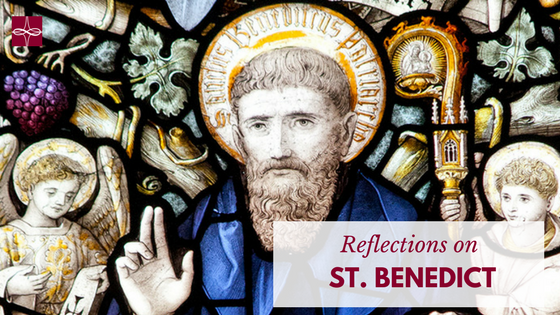
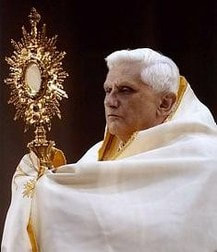

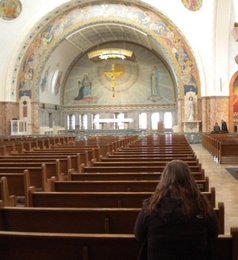
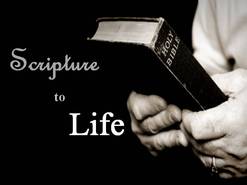
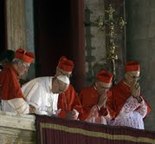

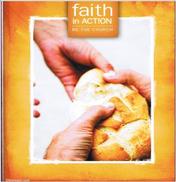
 RSS Feed
RSS Feed